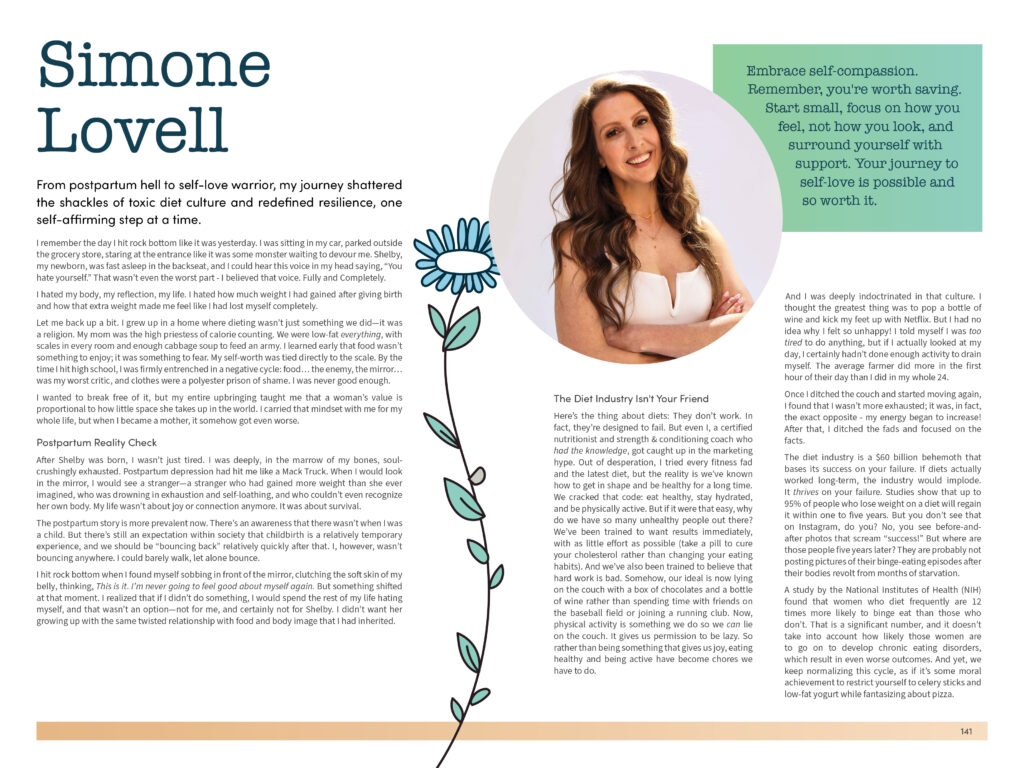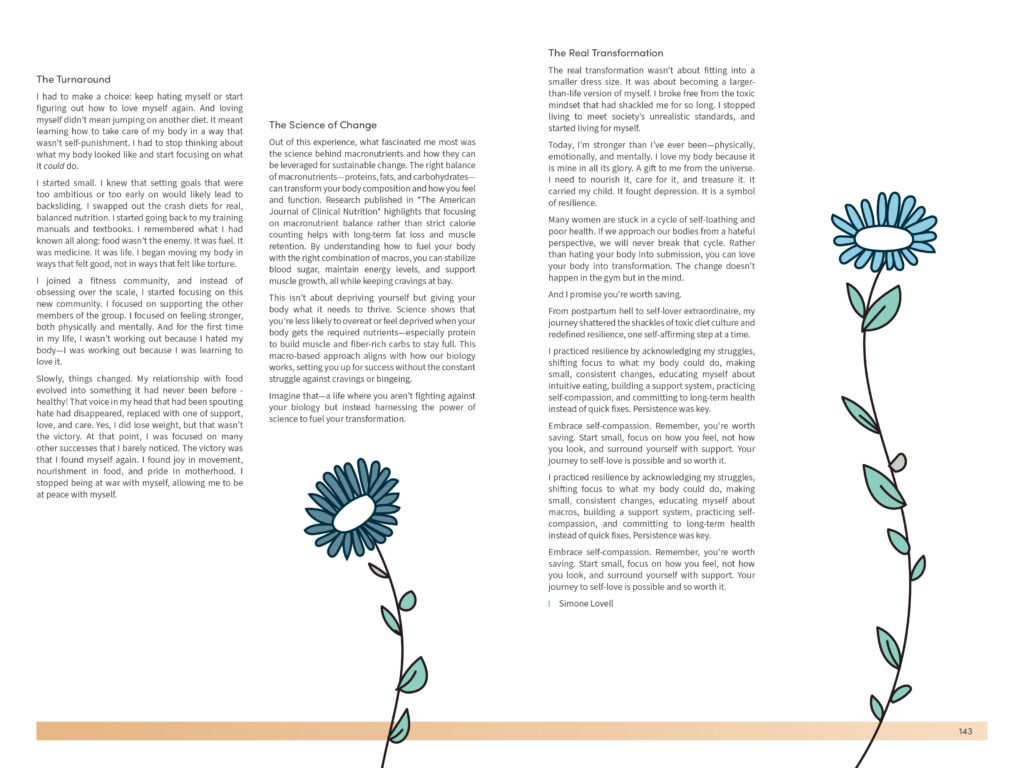From postpartum hell to self-love warrior, my journey shattered the shackles of toxic diet culture and redefined resilience, one self-affirming step at a time.
I remember the day I hit rock bottom like it was yesterday. I was sitting in my car, parked outside the grocery store, staring at the entrance like it was some monster waiting to devour me. Shelby, my newborn, was fast asleep in the backseat, and I could hear this voice in my head saying, “You hate yourself.” That wasn’t even the worst part – I believed that voice. Fully and Completely.
I hated my body, my reflection, my life. I hated how much weight I had gained after giving birth and how that extra weight made me feel like I had lost myself completely.
Let me back up a bit. I grew up in a home where dieting wasn’t just something we did—it was a religion. My mom was the high priestess of calorie counting. We were low-fat everything, with scales in every room and enough cabbage soup to feed an army. I learned early that food wasn’t something to enjoy; it was something to fear. My self-worth was tied directly to the scale. By the time I hit high school, I was firmly entrenched in a negative cycle: food… the enemy, the mirror… was my worst critic, and clothes were a polyester prison of shame. I was never good enough.
I wanted to break free of it, but my entire upbringing taught me that a woman’s value is proportional to how little space she takes up in the world. I carried that mindset with me for my whole life, but when I became a mother, it somehow got even worse.
Postpartum Reality Check
After Shelby was born, I wasn’t just tired. I was deeply, in the marrow of my bones, soul-crushingly exhausted. Postpartum depression had hit me like a Mack Truck. When I would look in the mirror, I would see a stranger—a stranger who had gained more weight than she ever imagined, who was drowning in exhaustion and self-loathing, and who couldn’t even recognize her own body. My life wasn’t about joy or connection anymore. It was about survival.
The postpartum story is more prevalent now. There’s an awareness that there wasn’t when I was a child. But there’s still an expectation within society that childbirth is a relatively temporary experience, and we should be “bouncing back” relatively quickly after that. I, however, wasn’t bouncing anywhere. I could barely walk, let alone bounce.
I hit rock bottom when I found myself sobbing in front of the mirror, clutching the soft skin of my belly, thinking, This is it. I’m never going to feel good about myself again. But something shifted at that moment. I realized that if I didn’t do something, I would spend the rest of my life hating myself, and that wasn’t an option—not for me, and certainly not for Shelby. I didn’t want her growing up with the same twisted relationship with food and body image that I had inherited.
The Diet Industry Isn’t Your Friend
Here’s the thing about diets: They don’t work. In fact, they’re designed to fail. But even I, a certified nutritionist and strength & conditioning coach who had the knowledge, got caught up in the marketing hype. Out of desperation, I tried every fitness fad and the latest diet, but the reality is we’ve known how to get in shape and be healthy for a long time. We cracked that code: eat healthy, stay hydrated, and be physically active. But if it were that easy, why do we have so many unhealthy people out there? We’ve been trained to want results immediately, with as little effort as possible (take a pill to cure your cholesterol rather than changing your eating habits). And we’ve also been trained to believe that hard work is bad. Somehow, our ideal is now lying on the couch with a box of chocolates and a bottle of wine rather than spending time with friends on the baseball field or joining a running club. Now, physical activity is something we do so we can lie on the couch. It gives us permission to be lazy. So rather than being something that gives us joy, eating healthy and being active have become chores we have to do.
And I was deeply indoctrinated in that culture. I thought the greatest thing was to pop a bottle of wine and kick my feet up with Netflix. But I had no idea why I felt so unhappy! I told myself I was too tired to do anything, but if I actually looked at my day, I certainly hadn’t done enough activity to drain myself. The average farmer did more in the first hour of their day than I did in my whole 24.
Once I ditched the couch and started moving again, I found that I wasn’t more exhausted; it was, in fact, the exact opposite – my energy began to increase! After that, I ditched the fads and focused on the facts.
The diet industry is a $60 billion behemoth that bases its success on your failure. If diets actually worked long-term, the industry would implode. It thrives on your failure. Studies show that up to 95% of people who lose weight on a diet will regain it within one to five years. But you don’t see that on Instagram, do you? No, you see before-and-after photos that scream “success!” But where are those people five years later? They are probably not posting pictures of their binge-eating episodes after their bodies revolt from months of starvation.
A study by the National Institutes of Health (NIH) found that women who diet frequently are 12 times more likely to binge eat than those who don’t. That is a significant number, and it doesn’t take into account how likely those women are to go on to develop chronic eating disorders, which result in even worse outcomes. And yet, we keep normalizing this cycle, as if it’s some moral achievement to restrict yourself to celery sticks and low-fat yogurt while fantasizing about pizza.
The Turnaround
I had to make a choice: keep hating myself or start figuring out how to love myself again. And loving myself didn’t mean jumping on another diet. It meant learning how to take care of my body in a way that wasn’t self-punishment. I had to stop thinking about what my body looked like and start focusing on what it could do.
I started small. I knew that setting goals that were too ambitious or too early on would likely lead to backsliding. I swapped out the crash diets for real, balanced nutrition. I started going back to my training manuals and textbooks. I remembered what I had known all along: food wasn’t the enemy. It was fuel. It was medicine. It was life. I began moving my body in ways that felt good, not in ways that felt like torture.
I joined a fitness community, and instead of obsessing over the scale, I started focusing on this new community. I focused on supporting the other members of the group. I focused on feeling stronger, both physically and mentally. And for the first time in my life, I wasn’t working out because I hated my body—I was working out because I was learning to love it.
Slowly, things changed. My relationship with food evolved into something it had never been before – healthy! That voice in my head that had been spouting hate had disappeared, replaced with one of support, love, and care. Yes, I did lose weight, but that wasn’t the victory. At that point, I was focused on many other successes that I barely noticed. The victory was that I found myself again. I found joy in movement, nourishment in food, and pride in motherhood. I stopped being at war with myself, allowing me to be at peace with myself.
The Science of Change
Out of this experience, what fascinated me most was the science behind macronutrients and how they can be leveraged for sustainable change. The right balance of macronutrients—proteins, fats, and carbohydrates—can transform your body composition and how you feel and function. Research published in *The American Journal of Clinical Nutrition* highlights that focusing on macronutrient balance rather than strict calorie counting helps with long-term fat loss and muscle retention. By understanding how to fuel your body with the right combination of macros, you can stabilize blood sugar, maintain energy levels, and support muscle growth, all while keeping cravings at bay.
This isn’t about depriving yourself but giving your body what it needs to thrive. Science shows that you’re less likely to overeat or feel deprived when your body gets the required nutrients—especially protein to build muscle and fiber-rich carbs to stay full. This macro-based approach aligns with how our biology works, setting you up for success without the constant struggle against cravings or bingeing.
Imagine that—a life where you aren’t fighting against your biology but instead harnessing the power of science to fuel your transformation.
The Real Transformation
The real transformation wasn’t about fitting into a smaller dress size. It was about becoming a larger-than-life version of myself. I broke free from the toxic mindset that had shackled me for so long. I stopped living to meet society’s unrealistic standards, and started living for myself.
Today, I’m stronger than I’ve ever been—physically, emotionally, and mentally. I love my body because it is mine in all its glory. A gift to me from the universe. I need to nourish it, care for it, and treasure it. It carried my child. It fought depression. It is a symbol of resilience.
Many women are stuck in a cycle of self-loathing and poor health. If we approach our bodies from a hateful perspective, we will never break that cycle. Rather than hating your body into submission, you can love your body into transformation. The change doesn’t happen in the gym but in the mind.
And I promise you’re worth saving.
From postpartum hell to self-lover extraordinaire, my journey shattered the shackles of toxic diet culture and redefined resilience, one self-affirming step at a time.
I practiced resilience by acknowledging my struggles, shifting focus to what my body could do, making small, consistent changes, educating myself about intuitive eating, building a support system, practicing self-compassion, and committing to long-term health instead of quick fixes. Persistence was key.
Embrace self-compassion. Remember, you’re worth saving. Start small, focus on how you feel, not how you look, and surround yourself with support. Your journey to self-love is possible and so worth it.
I practiced resilience by acknowledging my struggles, shifting focus to what my body could do, making small, consistent changes, educating myself about macros, building a support system, practicing self-compassion, and committing to long-term health instead of quick fixes. Persistence was key.
Embrace self-compassion. Remember, you’re worth saving. Start small, focus on how you feel, not how you look, and surround yourself with support. Your journey to self-love is possible and so worth it.


Are you ready to share your story of RESILIENCE? You can do that HERE.
